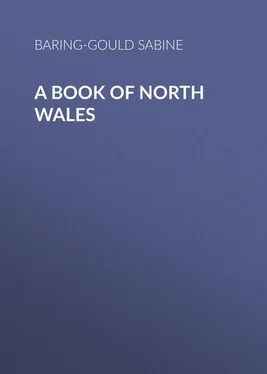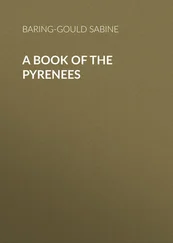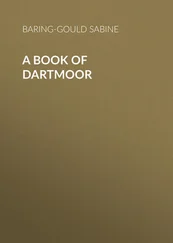Sabine Baring-Gould - A Book of North Wales
Здесь есть возможность читать онлайн «Sabine Baring-Gould - A Book of North Wales» — ознакомительный отрывок электронной книги совершенно бесплатно, а после прочтения отрывка купить полную версию. В некоторых случаях можно слушать аудио, скачать через торрент в формате fb2 и присутствует краткое содержание. Жанр: foreign_antique, foreign_prose, на английском языке. Описание произведения, (предисловие) а так же отзывы посетителей доступны на портале библиотеки ЛибКат.
- Название:A Book of North Wales
- Автор:
- Жанр:
- Год:неизвестен
- ISBN:нет данных
- Рейтинг книги:4 / 5. Голосов: 1
-
Избранное:Добавить в избранное
- Отзывы:
-
Ваша оценка:
- 80
- 1
- 2
- 3
- 4
- 5
A Book of North Wales: краткое содержание, описание и аннотация
Предлагаем к чтению аннотацию, описание, краткое содержание или предисловие (зависит от того, что написал сам автор книги «A Book of North Wales»). Если вы не нашли необходимую информацию о книге — напишите в комментариях, мы постараемся отыскать её.
A Book of North Wales — читать онлайн ознакомительный отрывок
Ниже представлен текст книги, разбитый по страницам. Система сохранения места последней прочитанной страницы, позволяет с удобством читать онлайн бесплатно книгу «A Book of North Wales», без необходимости каждый раз заново искать на чём Вы остановились. Поставьте закладку, и сможете в любой момент перейти на страницу, на которой закончили чтение.
Интервал:
Закладка:
This Llanfair Mathafarn was the birthplace of Goronwy Owen, the poet. He was born in 1722 of extremely poor parents, went to Oxford through help of Edward Wynne, of Bodewryd. Subsequently Mr. Wynne despatched him to Jesus College, Oxford, and maintained him there. From an early age he gave indications of poetic genius, and he proved himself to be a ripe scholar in the classic tongues.
He was ordained in 1745, and his great ambition was to obtain a Welsh curacy and settle down in it. Lewis Morris did his best for him, but all he could get was a temporary appointment to his native parish Llanfair, where the curacy chanced to be vacant. But he had been there only three weeks when he received notice from the Bishop of Bangor that he must turn out to make way for a young clergyman of large independent fortune; so Goronwy was obliged to depart. He sought curacies in Wales, but could get no bishop to touch him with the ends of his fingers, as he had no connections and no fortune. That he was deeply pious, earnest, a scholar, an eloquent Welsh preacher, and a poet of singular merit counted as nothing. Unhappily, though Goronwy was a genius, he was given to drink, and could never remain long anywhere. At length he obtained a curacy at Oswestry, and there he married. From Oswestry he was removed to Donnington, in Shropshire, where his rector was a Scotchman and an absentee, but being a Douglas, rich and with the means of pushing himself, having neglected his duties as parish priest, he managed to get himself nominated and consecrated Bishop of Salisbury. Lewis Morris did his best to save the poet from his unfortunate vice, but failed.
At Donnington poor Goronwy Owen not only acted as curate to the great absentee rector, but also as master of the grammar school, and received twenty-six pounds as his stipend. Thence he shifted, first into Cheshire and then to Northolt, near London. In 1756 he was living in a garret in town vainly soliciting employment in his sacred calling, and undergoing with his family the utmost privations. His Welsh accent in English stood in his way, and his brilliant Welsh qualifications were not wanted in Wales. But, indeed, poor Goronwy, with all his gifts, was not the man to do much spiritual work.
At length Lewis Morris obtained for Goronwy Owen the mastership of a Government school at Williamsburg, in Virginia. Thither he went, and there he died about the year 1770.
As Lewis Morris has been mentioned in connection with poor Goronwy Owen, a few words must be devoted to him.
“Lewis Morris,” says George Borrow, “was born at a place called Trev y Beirdd, in Anglesey, in the year 1700. Anglesey, or Mona, has given birth to many illustrious men, but few, upon the whole, entitled to more honourable mention than himself. From a humble situation in life, for he served an apprenticeship to a cooper at Holyhead, he raised himself by his industry and talents to affluence and distinction, became a landed proprietor in the county of Cardigan, and inspector of the royal domains and mines in Wales. Perhaps a man more generally accomplished never existed; he was a first-rate mechanic, an expert navigator, a great musician, both in theory and practice, and a poet of singular excellence. Of him it was said, and with truth, that he could build a ship and sail it, frame a harp and make it speak, write an ode and set it to music. Though self-taught, he was confessedly the best Welsh scholar of his age, and was well versed in those cognate dialects of the Welsh – the Cornish, Armoric, Highland Gaelic, and Irish… It was he who first told his countrymen that there was a youth in Anglesey whose genius, if properly encouraged, promised fair to rival that of Milton; one of the most eloquent letters ever written is one by him, in which he discants upon the beauties of certain poems of Goronwy Owen, the latent genius of whose boyhood he had observed, whom he had clothed, educated, and assisted up to the period when he was ordained a minister of the Church, and whom he finally rescued from a state bordering on starvation in London, procuring for him an honourable appointment in the New World.”
Lewis Morris made a collection of Welsh MSS., consisting of about eighty volumes, which are now in the British Museum. He died in 1765 and was buried at Llanbadarn Vawr, in Cardiganshire.
CHAPTER IV
HOLYHEAD
THE line from Bangor to Holyhead, after crossing the Menai Straits, runs through country that does not impress the traveller with an opinion that it is fertile or beautiful. The land is for the most part flat, or slightly undulating; there are no trees, much waste land, no mountains – only hills, and these away to the north. The surface of the island is speckled with little white houses with whitewashed roofs, as though a giant’s wedding had taken place there, and it was sprinkled over with the rice cast at the bride.
The line traverses the Malldraeth Marsh, and beyond Bodorgan station skirts Llyn Coron, a tarn with no picturesque surroundings, through which trickles the River Ffraw, that flows to the Aber, where once stood the residence, probably of timber, of the kings of Gwynedd.
Near the Llyn is Llangadwaladr, that takes its name from the last British prince who bore the title of King of All Britain. He was the son of Cadwallon ab Cadfan, and in the church is preserved the stone that bears the sententious inscription to inform the world that King Cadfan was “the wisest, the most renowned of all kings.”
The screen at Llaneilian has been already spoken of. It was delivered over to a joiner, who restored it by daubing over the paintings that decorated it, by hacking away the tracery that enriched it. Critics treat history in much the same fashion. They efface all the warm colouring that fancy has laid on, and eliminate all the detail which adorns it, leaving us but the naked scaffolding of fact.
If we deal in this way with the story of Cadfan and his grandson Cadwaladr, we arrive at very meagre and uninteresting outlines. We will therefore take the story much as we find it. Ethelfrid was king of Northumbria, and he sent away his wife, probably a British woman, and she took refuge with King Cadfan in Môn. There, shortly after her arrival at the court of Cadfan, the discarded queen became a mother, and bore a son to whom she gave the name of Edwin. About the same time the queen of Gwynedd bore one also, who was named Cadwallon.
The two boys were sent to be fostered in Brittany to King Solomon (there happened to be no king there of that name till two centuries later, but we will not be hypercritical).
In due course, when they were grown to man’s estate, the youths returned to Mona, and remained either there or at Deganwy till Cadfan died. Then Cadwallon assumed the crown of Gwynedd and the title of King of All Britain. Edwin went to Northumbria, where he was chosen king, and first of all the invading Angles and Saxons adopted a circlet of gold as symbol of sovereignty. Now one day Cadwallon was with his nephew Brian by the River Dulas when, overcome with the heat of the day, he laid himself down to sleep, with his head on Brian’s lap.
As he slept, Brian’s mind turned to the wrongs and sorrows that his countrymen had endured at the hands of the Teutonic invaders, and his tears ran down, and fell on Cadwallon’s face. The king was disturbed in his sleep by the falling drops, and, half asleep and half awake, he said, “It rains! It rains!”
Читать дальшеИнтервал:
Закладка:
Похожие книги на «A Book of North Wales»
Представляем Вашему вниманию похожие книги на «A Book of North Wales» списком для выбора. Мы отобрали схожую по названию и смыслу литературу в надежде предоставить читателям больше вариантов отыскать новые, интересные, ещё непрочитанные произведения.
Обсуждение, отзывы о книге «A Book of North Wales» и просто собственные мнения читателей. Оставьте ваши комментарии, напишите, что Вы думаете о произведении, его смысле или главных героях. Укажите что конкретно понравилось, а что нет, и почему Вы так считаете.












